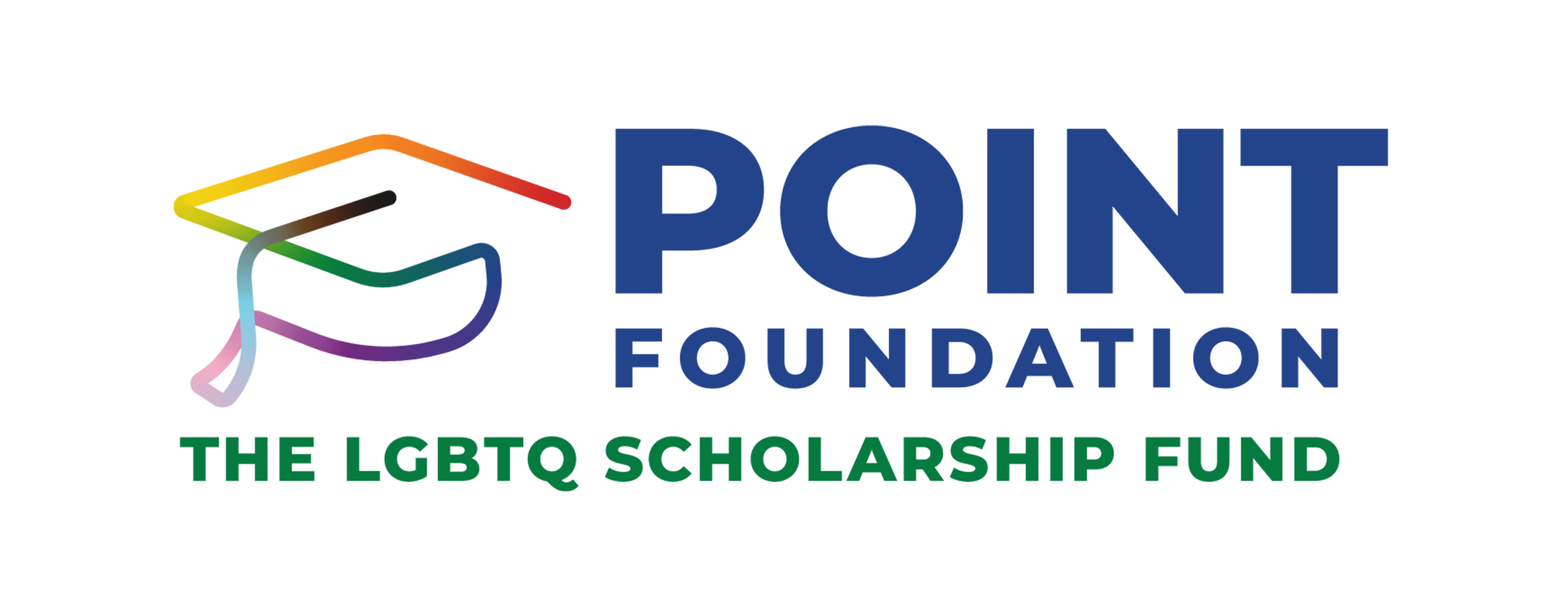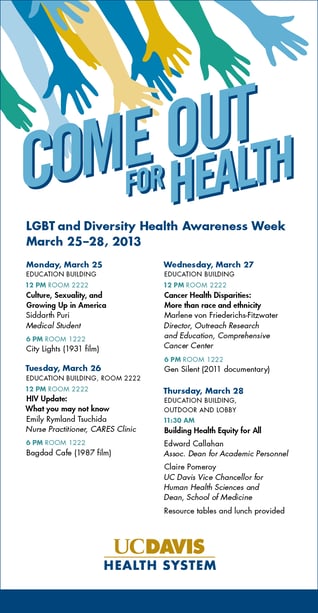Photo: Scholar Sid Puri (left) with students from the LGBTQ+ lecture series.
Point Scholars are required to complete an annual Community Service Project (CSP) that will positively impact the LGBTQ community. Here is a highlight of Point Scholar Siddarth Puri’s recent CSP.
The 2011 LGBTQ+ Healthcare report by the Institute of Medicine noted that stigma and provider knowledge were two of the major deterrents to receiving quality healthcare for the LGBTQ+ population. My Community Service Project for Point aimed to decrease these health disparities by increasing knowledge of the medical concerns of the LGBTQ+ community through a lecture and discussion series for medical student, residents, and faculty at UC Davis. The seven-part lecture series provided students with an opportunity to enhance their understanding of the medical needs of the LGBTQ+ population and use the skills they will learn into practice in settings at the student-run clinics or with standardized patients. The lectures included topics on general health discrimination, mental health and LGBTQ+ youth, transgender healthcare, a lesbian health panel, the Intersex community and two case discussions. It provided a platform to discuss health issues relating to the LGBTQ+ community that aren’t covered in other courses. Supplementing the curriculum with this elective series ensures medical students are aware of the disparities faced by the LGBTQ+ community and understand ways to reduce them.
GOALS
- The objective of the LGBTQ+ Healthcare elective is to increase the awareness of medical issues surrounding the LGBTQ+ community and arm students with knowledge of the health disparities the community faces in order to provide better quality care to the LGBTQ+ patients they care for as physicians. By the end of the elective, participants will have a working knowledge of:Basic information about LGBTQ+ individuals
- The health disparities and health risks faced by LGBTQ+ individuals
- The health-related behaviors that disproportionately affect LGBTQ+ individuals
- The barriers to health care access faced by LGBTQ+ individuals
- The appropriate screenings and vaccinations for LGBTQ+ patients
Additionally, participants will be able to:
- Take a full sexual history with an LGBTQ+ patient, responding sensitively and non-judgmentally to information received.
- Assess one’s own LGBTQ+-related bias, and address it effectively
- Respond effectively to witnessing bias towards an LGBTQ+ patient.
IMPLEMENTATION
I recruited faculty members from UC Davis as well as community members involved in delivering healthcare to the LGBTQ+ population to deliver a lecture. I provided a pre and post-test to determine if participants were benefiting from the lecture.
I gave the first lecture that explained the need for an increase in understanding LGBTQ+ healthcare disparities and briefly touched upon the healthcare concerns facing gay men, lesbians, transgender patients, LGBTQ+ youth and the bisexual community. I organized the subsequent lectures including the transgender lecture given by Dr. Gorton from the Lyon-Martin clinic in San Francisco who discussed the importance of honest dialogue and communication with transgender patients. We showed a video lecture by Dr. Robert Bidwell from the University of Hawaii who has done extensive research on LGBTQ+ youth and how to best discuss relationships, suicide and mental health problems with adolescents in the clinical setting. I organized an Intersex talk with Galen Sanders, from the UC Davis radiology department who discussed his own experiences as an Intersex person. The lesbian healthcare panel consisting of physicians and healthcare works from UC Davis and gave a short presentation on healthcare disparities among lesbians.
The final part of the series was a two-part discussion session with case studies. The cases were based on the lectures and included a scenario with an adolescent coming out, a lesbian asking about pregnancy and a child born with ambiguous genitalia.
RESULTS
38 students at the medical school received an elective credit for their attendance. From the results of the pre and post-test (shown below) major findings included:
- 68% of providers were very uncomfortable with transgender (both MTF and FTM) patients prior to the lecture and only 28% were very uncomfortable with transgender (both MTF and FTM) after the lecture series.
- 48% of participants said they believe their education up until now has provided them with tools to treat LGBTQ+ patients. After the lecture it rose to 94%
- Prior to the lectures, 32% strongly agreed with the statement “they were aware of the specific medical conditions that disproportionately affect the LBGTQ+ community.” 98% strongly agreed afterwards.
- 85% stated they would make changes in the way they interacted with LGBTQ+ patients.
| This post was written by Janssen Therapeutics Point Scholar Siddarth Puri | |
| Born in Kentucky, to Indian immigrants, Siddarth Puri was raised in Los Angeles, California. Watching his mother, a physician, work with patients in Los Angeles and in rural India taught him the importance of advocating for the underserved. He is currently attending UC Davis School of Medicine and pursuing research on health disparities faced by the transgender community both in the US and in India. He continues to strive towards integrating his cultural and sexual identities and has a special interest in supporting queer South Asians through the process of coming out to their families. Learn more about Siddarth. | |

